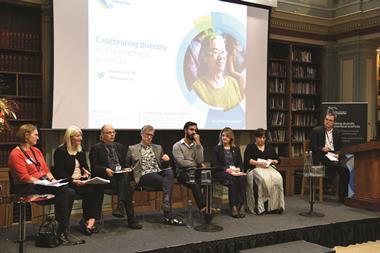The battle against bias requires compassion, not metrics
Every day we assess other people. Whether we are filling a job vacancy, assigning team members to particular tasks, deciding on promotions or awarding prizes, we want to find individuals with the best track record or the most potential. But what do those words mean – and are we using good criteria and reasoning?
Culture problems
Historically, biases – whether conscious or unconscious – have resulted in older white men in grey suits supporting, appointing and promoting younger white men in grey suits from similar backgrounds. Yet we know from studies of boardrooms that there is strength in diversity, and that organisations benefit from representation of a broad range of skills, interests and backgrounds. Improvements to equality, diversity and inclusion are not only about being fair to historically-under-represented groups: they are good business sense too.
Most of my personal experience is in research-intensive universities. They, and their public- and private-sector research sponsors, are under pressure to demonstrate maximum productivity from their grants and contracts. Typically, they determine success by research income, group size, journal impact factors and immediate impact. This can lead them indirectly – and perhaps unconsciously – to encourage inappropriate behaviours by their current staff, which in turn discourages less aggressive personalities from applying or being seen as ‘successful’. Therefore, institutions are increasingly in danger of selecting and supporting only a narrow range of skills and personalities. It is an approach that leads to a mono-culture defined by research metrics and antithetical to a genuinely broad and diverse workforce.
Too many institutions prioritise, or at least tolerate, the ‘driven research group leader’ who demands a ‘results above all else’ culture that that can lead to bullying and excessive work hours. Again, we know that long hours and poor work culture leads to lower productivity than more inclusive and humane ways of working. Such employers and research sponsors need to take their responsibility for the researchers employed through grants more seriously. This includes encouraging a nurturing culture amongst grant holders and enabling parental leave. After all, this year’s postdocs are the next generation of leaders; we need them to learn higher standards of behaviour.
Conventional metrics, focused on research success of individuals, can also create a distorted picture. This approach favours those who publish often and loudly, especially those who work in currently hot topics. Often, true breakthroughs come from unexpected sources, are published in ‘low impact’ journals and (almost by definition) contradict conventional wisdom. The long-term worth of a paper may only become apparent after many years – as is clear if one reads the acceptance lectures of many past Nobel prize winners.
Broadening opportunities
There are practical steps we can take to address these problems. If we want to appoint and attract individuals with broader, more outward-looking interests, our advertisements should use less aggressive language. For example, some personality types are reluctant to apply for jobs in ‘world-leading’ institutions – a trait that particularly applies to many women ideally suited for these roles. It also clear that listing ten ‘essential’ skills or personality traits for a role has a discriminatory effect: to generalise wildly, men are likely to apply if they think they have four or five of the ten, while women are more likely to feel that they need to tick almost all the boxes.
We must recognise that success is not all about research, nor all about individuals. We also need to appoint, promote and recognise equally those who really care about teaching and people – skills just as important to the vitality and success of institutions, colleagues and students. Of course, ‘all-rounders’ who can do everything well is desirable, but we also need to think about how to compare the fruit of hard work against innate brilliance.
I believe our idea of success needs to embrace a much more holistic view of achievement and lifestyle. We should recognise the importance of teams working together for everyone’s benefit and devise reward mechanisms that reward them properly. We should also recognise the value of a rounded life that supports family, friends and social action. Employers still tend to focus only on ‘full-time’ staff even though those who work part-time have much to contribute and need to be given much more consideration. Terms and conditions for part-time staff are often inferior to those for full-timers, an unjustifiable act of discrimination (that may or may not be unconscious) to the detriment of employer and employee alike.
People with mild neurodiverse conditions such as autism have also suffered discrimination. While mild autism can be seen as a disability, an increasing number of companies, especially those that are data-driven, are realising that, using specially designed recruitment and assessment methods, they should be actively looking for such candidates because they have a valuable set of skills.
Success comes in many forms and has multiple meanings. If we are to maximise and celebrate it, we need to apply genuine human intelligence and compassion in assessment and recognition, rather than relying on metrics that will inevitably filter out subtlety and the unusual. Everyone would benefit.
References












No comments yet